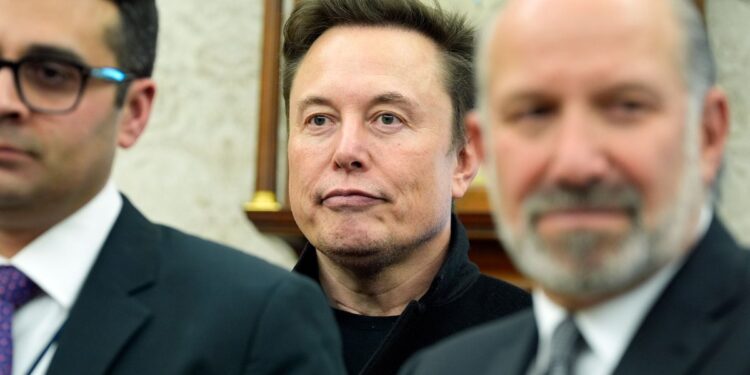This story was originally published on the author’s substack, Field Notes with Alexander C Kaufman, to which you can subscribe here.
Elon Musk is serving as President Donald Trump’s hatchetman, slashing government spending as part of the administration’s efforts to end federal support for everything from dying babies in warzones and Americans displaced by disasters to US schools and startups working to slash energy bills for rural farmers and grocers.
As the world’s richest man pitches himself as the savior of the American taxpayer, the companies he runs are raking in more federal dollars.
This past Sunday, Tesla finalized a deal to sell 430 megawatts of batteries to Genera, the private company that now operates Puerto Rico’s power plants, for $767 million. The contract, first brokered in October before the election, will be “fully financed with federal funds,” according to a press release.
On Monday, SpaceX netted another $7.5 million supplemental contract with NASA, bringing the total value of that particular deal with Musk’s private rocket firm to $38 million. That’s on top of the more than $4 billion NASA is already paying SpaceX.
“Over and over again, he’s just involved in governmental actions that directly and substantially impact his own financial wellbeing.”
Appearing on television alongside the president in the Oval Office on Tuesday, a defiant Musk dismissed concerns over any conflicts of interest, insisting he had little to do with contracts brokered by the companies where he serves as chief executive.
“You have to look at the individual contract,” Musk told reporters. “First of all, I’m not filing the contract. It’s people at SpaceX…and I like to say if you see any contract where it was awarded to SpaceX and it wasn’t by far the best value for the taxpayer, let me know—because every one of them was.”
On Thursday, the State Department backed away from plans to spend $400 million on armored Tesla vehicles, after the proposal was revealed on social media and reported by the New York Times. The procurement forecast did not specify which Tesla model would be purchased, but the Times speculated the stainless-steel Cybertruck “would be the most suitable vehicle,” despite questions about its safety.
All seven of Musk’s companies—which include X (formerly Twitter), xAI (a rival to OpenAI), Neuralink (a brain implant startup), Starlink (satellite internet service) and the Boring Company (a tunnel drilling firm), in addition to Tesla and SpaceX—have netted a combined $20 billion in US government contracts and subsidies, according to the Financial Times.
“Elon Musk is a walking conflict of interest,” Craig Holman, the government affairs lobbyist at the consumer watchdog Public Citizen, told me by phone on Thursday. “Over and over again, he’s just involved in governmental actions that directly and substantially impact his own financial wellbeing.”
The federal code known as 18 USC 208 “prohibits an executive branch employee from participating personally and substantially in a particular Government matter that will affect his own financial interests, as well as the financial interests of certain individuals with whom he has ties outside the Government,” according to the US Office of Government Ethics.
In theory, that “should” apply to Musk, Holman said. But Trump can easily issue a waiver exempting Musk from complying with the rules as a so-called special government employee.
Lawmakers have considered tightening federal ethics rules on special government employees in the past, but those were “not serious efforts,” Holman said.
“We haven’t seen this type of abuse until now,” he said.






